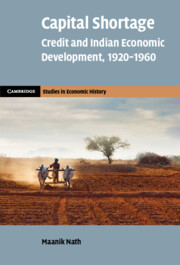Book contents
- Capital Shortage
- Cambridge Studies in Economic History
- Capital Shortage
- Copyright page
- Contents
- Figures
- Tables
- Acknowledgments
- 1 Introduction
- 2 Agriculture, Commerce and Governance in the Longue Durée
- 3 Climate and Credit
- 4 Courts and Credit
- 5 Regulating Moneylenders
- 6 Regulating Cooperatives
- 7 Credit after 1960
- 8 Conclusion
- Epilogue
- Bibliography
- Index
5 - Regulating Moneylenders
Published online by Cambridge University Press: 08 September 2023
- Capital Shortage
- Cambridge Studies in Economic History
- Capital Shortage
- Copyright page
- Contents
- Figures
- Tables
- Acknowledgments
- 1 Introduction
- 2 Agriculture, Commerce and Governance in the Longue Durée
- 3 Climate and Credit
- 4 Courts and Credit
- 5 Regulating Moneylenders
- 6 Regulating Cooperatives
- 7 Credit after 1960
- 8 Conclusion
- Epilogue
- Bibliography
- Index
Summary
Summary: The exploitation of peasants by moneylenders has been conventionally put forward as an explanation for persistent rural poverty. Governments in colonial and post-colonial India repeatedly intervened to correct power imbalance in credit markets. This chapter traces the design and impact of the origins of credit intervention in South India, investigating how lenders responded to the Madras Agriculturists Relief Act (MARA) implemented in 1937. The MARA enforced a ceiling on interest rates far below the rates charged in the unregulated market. Intervention had unintended effects. The MARA reduced credit availability, and the market operated both less equitably and less efficiently than it did before. Paradoxically, efforts to formally regulate credit disassociated the market from administrative procedures as lenders went underground and a black market for loans emerged in the 1940s and 1950s. A policy approach that prioritised equity over efficiency, the MARA failed to address the underlying reasons behind the high costs and shortage of capital.
Keywords
- Type
- Chapter
- Information
- Capital ShortageCredit and Indian Economic Development, 1920–1960, pp. 109 - 149Publisher: Cambridge University PressPrint publication year: 2023



